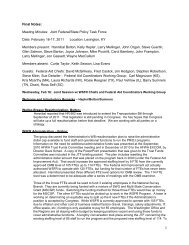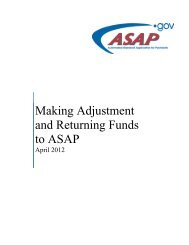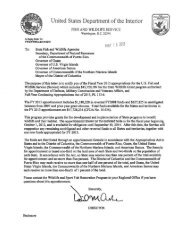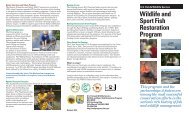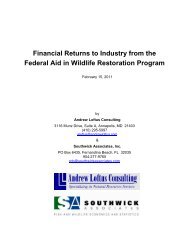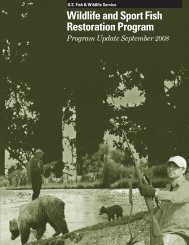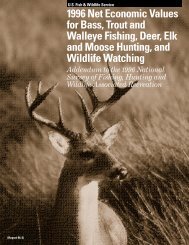May 20-21 - Wildlife and Sport Fish Restoration Program
May 20-21 - Wildlife and Sport Fish Restoration Program
May 20-21 - Wildlife and Sport Fish Restoration Program
Create successful ePaper yourself
Turn your PDF publications into a flip-book with our unique Google optimized e-Paper software.
FWS is now in the normal phase of ASAP <strong>and</strong> FBMS. Should not expect the<br />
same initial delays in grant processing when FBMS was first rolled out.<br />
September 24 th –October 1 <strong>20</strong>13 ASAP blackout.<br />
Currently working with seven states with assent legislation concerns.<br />
o Funds need to be in control of state fish <strong>and</strong> wildlife agencies.<br />
o FWS faces 5-10 assent legislation issues every year.<br />
o These issues happen outside the control of the state agencies. This is<br />
legislation that is being done to the states.<br />
Had spring combined meeting with regional chiefs/federal aid coordinators in<br />
April <strong>20</strong>13.<br />
o Will travel be authorized for federal aid chiefs to travel to the federal aid<br />
coordinator meeting? FWS: Yes. This is in line with the critical mission<br />
of the FWS.<br />
Financial assistance wiki will be released to the public in late June. The website<br />
for the wiki is: fawiki.fws.gov.<br />
TRACS has the beta version released in March. All of the WSFR staff have been<br />
trained. State training began in Denver <strong>and</strong> Alaska. Have received positive<br />
responses from the training. Production version will be released later this month.<br />
Initial production release will have 3 of the 9 initial modules. It will take<br />
approximately 12 months, at the existing staffing levels to complete the initial 9<br />
modules.<br />
No policy issues have arisen from the beta testing.<br />
The last item that needs to be completed is adding a disclaimer to the public<br />
TRACS website.<br />
Guidance committee (consists of Federal Aid Coordinators, <strong>and</strong> State <strong>and</strong> Service<br />
staffs) has drafted a system guidance document for TRACS with questions <strong>and</strong><br />
answers. It follows all the general policies established in the JTF.<br />
The legacy data (FAIMS) is in the process of being converted to TRACS. Fair<br />
amount of time needed to get this accomplished.<br />
Information that is displayed in public TRACS will be a high level summary<br />
(summary of project, estimated cost, where the project is located, etc) <strong>and</strong> will be<br />
determined by state agencies not FWS. This information will be under the<br />
control <strong>and</strong> discretion of the states.<br />
States can also create tailored public TRACS websites.<br />
State agencies will have two licenses for their staff to access the TRACS program.<br />
If a state will need additional licenses then they will need to coordinate with<br />
Paladin not FWS. These licenses will be good for five years when the contract<br />
between FWS <strong>and</strong> Paladin is renegotiated.<br />
States will have unlimited licenses for data TRACS because this is a federal<br />
system which FWS will operate.<br />
L<strong>and</strong> acquisition projects in TRACS should be as detailed as possible. This<br />
information will be up to the discretion of the state agencies to determine how<br />
detailed they will be.<br />
It’s important to document the agreement made regarding the state wildlife<br />
agencies ability to determine what information will go into public TRACS.<br />
4




